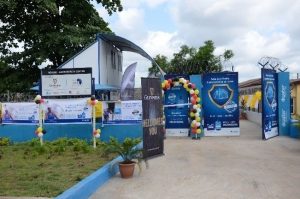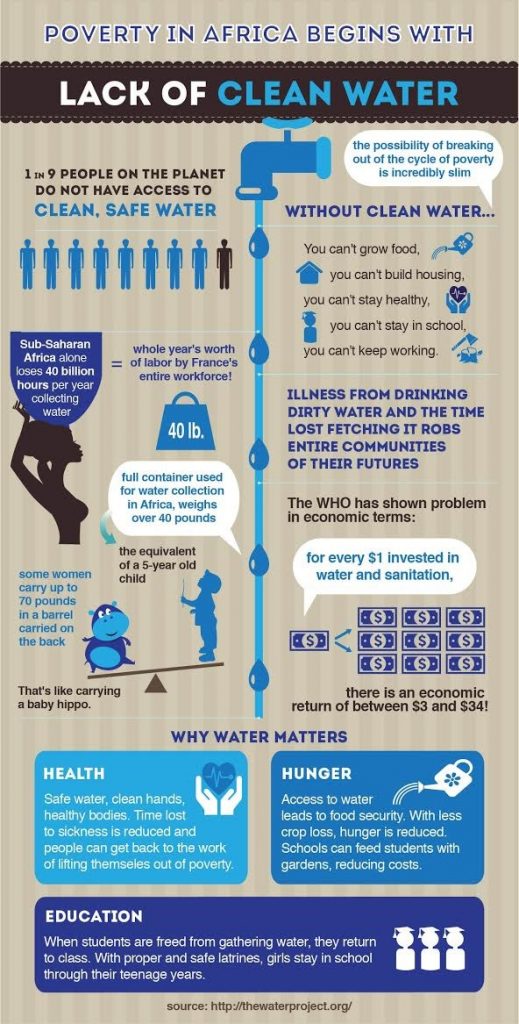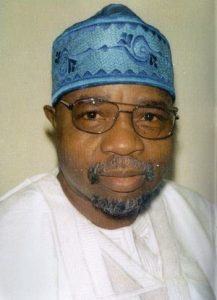Water is directly linked to an area’s economic state, ‘without clean water you can’t grow food… you can’t stay healthy, you can’t stay in school and you can’t keep working’. [1]
Nigeria Facts
Nigeria, one of the group of countries in Africa that are not land-locked, is comprised of 36 different states with a total surface area of 923,768km2, 1.4% of which is water. In 2017, it had a population of 190 million people (an increase of 58% in just 17 years) and is the most populous country in Africa. Its largest city is Lagos which thrives on keeping the economy buoyant and water accessibility high. The fact it is not land-locked means trade is easy and fluid and the Lagos Port Complex is the largest port in Nigeria. Most of Nigeria’s water comes from Lagos as it is surrounded by a lagoon, sea and rivers. The two rivers Ogun and Owo are the main sources of clean water across the whole of Nigeria. It is the abundance of oil that mainly drives Nigeria’s economic boom, but accessibility to water is also important. Nigeria’s density is now 215 people per km2 so we can see that Lagos has done well to support the water provisions to those myriads of people, as ‘seven in ten people now have clean water to drink’.
Water issues
Nigeria is rich with water resources (for example, 215 cubic kilometres of surface water a year) and 67% of people have aces to a safe and secure water supply. But this means that 33% of Nigerians suffer from poor quality of water, affecting the people, environment and economy (echoing the first statement of this blog).
The access to clean water (different to a basic water supply in that it is safer, without a chance of illness or disease) is also unevenly distributed and in rural areas only 19% of the population has access to safe drinking water.
Water conservation in Africa is a major issue ‘everywhere, even in areas where there is an abundance of water.’ Problems are exacerbated when Trans-National Corporations (TNCs) arrive using the natural resources. These organisations do not have water conservation in the forefront of their mind and the problem can increase if the organisation produces beverages.
My Grandpa
My Grandfather was a wonderful man, both strong for his family and also affectionate. I do not recall a single moment where he wasn’t in high spirits. I loved him and looked up to him, especially after the death of my grandma when I was 6 and I grew even closer to him. As I grew up I heard more and more about what type of man he was, and all he had achieved. Raphael Adeola Alabi (to give his full name) was a Nigerian engineer. After receiving his education as a mechanical engineer, he went on to start as a trainee at Guinness, rising through the ranks and eventually spending 13 years of his life as chairman of the organisation. He also founded his own engineering consultancy company. Ralph Alabi was a loving yet strict father; he did all things to teach his children how to live life with no regrets, to strive for success just like he did. He taught his children well and his teachings rippled through my largely expanding African family through to me and my sibling. [2]
Trans-National Corporations and their solutions to clean water accessibility
 Guinness Nigeria is currently attempting to fix the situation surrounding the lack of widely accessible clean water one step at a time. Currently they have both reducing their environmental impact as well as increasing the quality of life of the locals. They have completed 22 water projects over several states in Nigeria; reaching more than a million people with their work. In 2012, the Safe Water for Africa Partnership launched in Lagos and one of the involved organisations are Guinness Nigeria others include Coca Cola, Diageo and the TY Danjuma Foundation. This partnership means that each organisation contributes a fund to help provide clean drinking water to many African citizens. More recently Guinness Nigeria have revealed seven new boreholes in Cross River State. These boreholes will provide more than 7,000 people with ‘year-round’ access to water. Although my grandfather passed almost 10 years ago, showing respect for his achievements Guinness Nigeria hosts a yearly speech in his honour. Nigerians are working hard to better their conditions, just like my grandpa, working through hard times and tough conditions to prosper for a better future for the next generation of Nigerian citizens as well as for us, the Alabi bloodline. Thanks to the hard work of Ralph Alabi I could have an education and a great quality of life. Thus, we wish to carry on the legacy of Ralph Alabi and do him proud. [3]
Guinness Nigeria is currently attempting to fix the situation surrounding the lack of widely accessible clean water one step at a time. Currently they have both reducing their environmental impact as well as increasing the quality of life of the locals. They have completed 22 water projects over several states in Nigeria; reaching more than a million people with their work. In 2012, the Safe Water for Africa Partnership launched in Lagos and one of the involved organisations are Guinness Nigeria others include Coca Cola, Diageo and the TY Danjuma Foundation. This partnership means that each organisation contributes a fund to help provide clean drinking water to many African citizens. More recently Guinness Nigeria have revealed seven new boreholes in Cross River State. These boreholes will provide more than 7,000 people with ‘year-round’ access to water. Although my grandfather passed almost 10 years ago, showing respect for his achievements Guinness Nigeria hosts a yearly speech in his honour. Nigerians are working hard to better their conditions, just like my grandpa, working through hard times and tough conditions to prosper for a better future for the next generation of Nigerian citizens as well as for us, the Alabi bloodline. Thanks to the hard work of Ralph Alabi I could have an education and a great quality of life. Thus, we wish to carry on the legacy of Ralph Alabi and do him proud. [3]
[1] https://thewaterproject.org/
[2] https://en.wikipedia.org/wiki/Ralph_Alabi
[3] https://www.guinness-nigeria.com/in-society/water-of-life/


